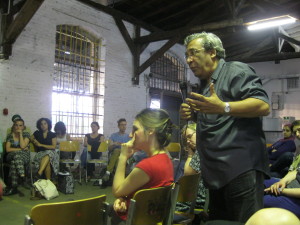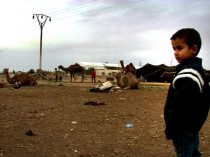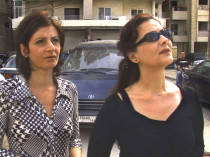“The media system always adapts itself to the winners” – Report on our discussion about the state of the media in Egypt

Mohamed Selim Khalil, Egyptian journalist, lecturer at the
 Westfälische Wilhelms-Universität in Münster and media analyst with research focus on political communication in the Arab world criticised the lack of basic journalistic ethics in Egypt : “The media system always adapts itself to the winners.” According to him, in Egypt there is only one narrative, and it is controlled by the state. The media are not independent but closely linked with the Ministry of Information. Thus, in this politically turbulent time, the media are also in a chaotic state.
The Egyptian journalist and former vice-director of the Egyptian state-owned TV station Nile-TV Shahira Amin, who quit her job during the protests in 2011 to join the demonstrators and to protest against the state-controlled reporting on the revolution, told the audience that until now she is being ignored by some of her colleagues or is even treated with hostility because she is being seen as a traitress. She noted that journalists in Egypt are hardly trained in journalistic techniques, instead they learn how to follow the official line of the authorities. Currently this line is defined by the military, “censorship is back”.
Westfälische Wilhelms-Universität in Münster and media analyst with research focus on political communication in the Arab world criticised the lack of basic journalistic ethics in Egypt : “The media system always adapts itself to the winners.” According to him, in Egypt there is only one narrative, and it is controlled by the state. The media are not independent but closely linked with the Ministry of Information. Thus, in this politically turbulent time, the media are also in a chaotic state.
The Egyptian journalist and former vice-director of the Egyptian state-owned TV station Nile-TV Shahira Amin, who quit her job during the protests in 2011 to join the demonstrators and to protest against the state-controlled reporting on the revolution, told the audience that until now she is being ignored by some of her colleagues or is even treated with hostility because she is being seen as a traitress. She noted that journalists in Egypt are hardly trained in journalistic techniques, instead they learn how to follow the official line of the authorities. Currently this line is defined by the military, “censorship is back”.
Christoph Dreyer, press officer and Middle East expert at Reporters Without Borders, explained this with the fact that the freedom of press, which is recognised in the new Egyptian Constitution, is not being implemented; permanent exceptions are justified by the necessity of fighting terrorism. Large parts of the political landscape are censored, and there is no public discourse about the political events in the country.
Also Farid Farid, media coordinator for Middle East and North Africa at Transparency International, saw no practical effects of the civil rights and liberties defined in the Constitution. He criticised the journalistic practices of the corrupt state media which even fabricate and exaggerate artificial news, thereby distracting from the really important issues.
Following the first panel discussion, various independent blogs and bloggers from Egypt were introduced in a brief overview, to discuss the meaning of citizen journalism for critical reporting in Egypt. Regarding this development, all panelists saw reason to hope for an improvement of the situation, as an alternative reporting through social media and open media platforms is now becoming more and more possible. The Egyptians acquired a liking for this new-discovered freedom, said Shahira Amin, and also Farid Farid saw in the new blogs a symbol of hope. However, Christoph Dreyer critically noted that the online social media in Egypt are used only by a minority of people and that still numerous censorship options exist.
A question from the audience inquired into who really stands behind the censorship in Egypt. The answer was that censorship needs to be regarded as a mix of several measures. The major media institutions in Egypt are state media, which set the agenda, or media outlets influenced by the state media, who stay loyal to the businessmen from the Mubarak era. In addition, there is a self-censorship of the journalists who do not want to lose their jobs and who therefore adapt to the state narrative. At the same time, critical journalists are always in danger of being accused by prosecutors as terrorists or being attacked on the street by mobs.
In the face of the recent turbulent political developments in Egypt, more and more people desire peace, order and security and many of them hope to get this from the presidential candidate Al-Sisi. For Mohamed Selim Khalil this hope lies elsewhere. Asked by the audience whether one could even speak about a revolution, given that everything remained the same concerning the ruling elites, he replied: “We do not need a revolution, we need media, real media. »
behind the censorship in Egypt. The answer was that censorship needs to be regarded as a mix of several measures. The major media institutions in Egypt are state media, which set the agenda, or media outlets influenced by the state media, who stay loyal to the businessmen from the Mubarak era. In addition, there is a self-censorship of the journalists who do not want to lose their jobs and who therefore adapt to the state narrative. At the same time, critical journalists are always in danger of being accused by prosecutors as terrorists or being attacked on the street by mobs.
In the face of the recent turbulent political developments in Egypt, more and more people desire peace, order and security and many of them hope to get this from the presidential candidate Al-Sisi. For Mohamed Selim Khalil this hope lies elsewhere. Asked by the audience whether one could even speak about a revolution, given that everything remained the same concerning the ruling elites, he replied: “We do not need a revolution, we need media, real media. »
—
The event was presented by Frédérique Lang (14km). Other contributors from 14km included Anja Gebel, Helena Burgrova, Eugenie Rooke, Elisa Totino, Andreas Fricke and Steffen Benzlers, and Christoph Dreyer from Reporters Without Borders.



